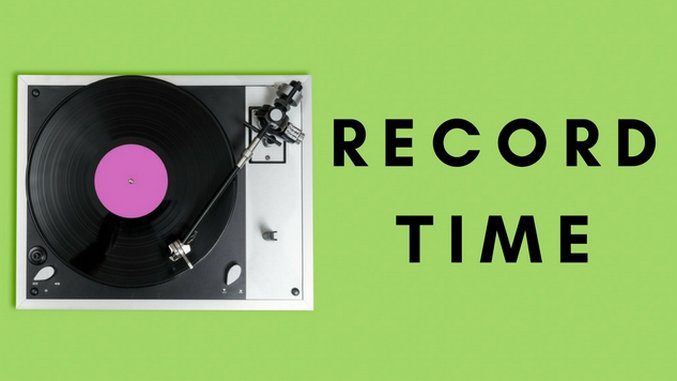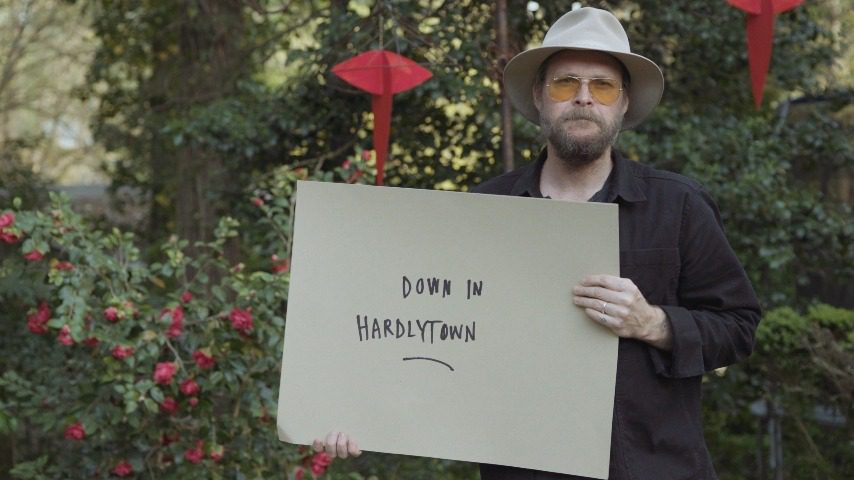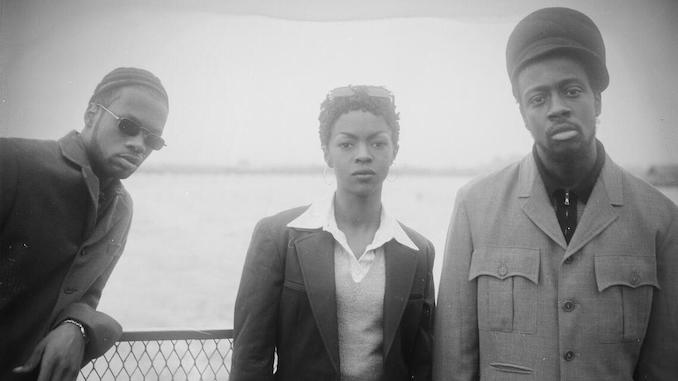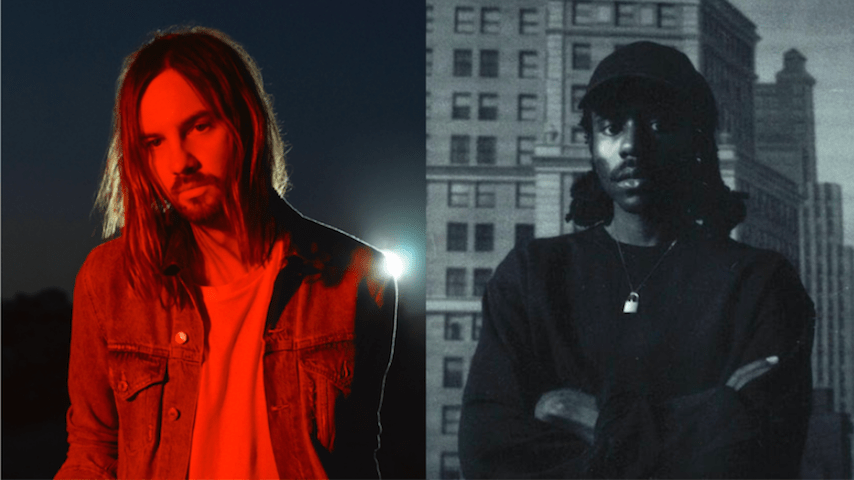Record Time is Paste’s monthly column that takes a glimpse into the wide array of new vinyl releases currently flooding record stores around the world, and all the gear that is part of the ongoing surge in vinyl culture. Rather than run down every fresh bit of wax in the marketplace, we’ll home in on special editions, reissues and unusual titles that come across our desk with an interest in discussing both the music and how it is pressed and presented. This month, that includes a boxed set from some Krautrock legends, live reggae and an early contender for the best album of the year.
Toneoptic rpm
A topic of conversation that comes up from time to time among the vinyl collectors I know is how much we wish we could replicate the experience of flipping through a bin of LPs at our favorite record shop within our home library. Scanning the spines of my records on my IKEA shelves is not bad, but I do love drinking in the album art as I contemplate what to put on the turntable. Instead, I’d love to make use of an rpm, the vinyl storage solution that Fabian Geyrhalter dreamed up for his company Toneoptic. These elegant cubes hold a small selection of LPs (each one holds around 60 records) on a platform that pulls out like a drawer and then spins around so you can flip through them like you’re digging in a DJ crate or at a shop. These may not be an ideal fix for folks with a large library of wax as each rpm retails at around $4,000 — not to mention there are only a limited number of them available. You certainly get what you pay for those as these are all being handmade by a small woodworking team in L.A. and they weigh in at 50 lbs. Sturdy enough to handle even your heaviest LPs without collapsing in a heap.
John Coltrane: ”Live” At The Village Vanguard / Crescent (Impulse/Acoustic Sounds)
The reissues of two classic John Coltrane albums released this month in new, sparkling vinyl editions by Acoustic Sounds are the blueprints for what would become the next major phases in the saxophonist’s evolution. On the horizon following this early ’60s period were the spiritual jazz of A Love Supreme and the explosive free jazz of Ascension. Elements of those progressions flow through these albums like a small stream that heralded a mighty river. The live album, released in 1962, was a particularly bold step forward for Coltrane. For his run of dates at the Village Vanguard, he brought in bass clarinetist Eric Dolphy, who, on the expansive “Spiritual,” added a splash of astringency to match the acid of Trane’s soprano sax within the song’s fuming broth. On 1964’s Crescent, Coltrane was pulling apart traditional jazz approaches to see what he could do away with and still make an impact. He doesn’t solo at all on the second side of the LP to make way for bassist Jimmy Garrison’s dazzling turn on “Lonnie’s Lament” and Elvin Jones’ fireworks display on “The Drum Thing.”
Various Artists: The D-Vine Spirituals Records Story Volume One & Two (Bible & Tire)
In the late ’60s, Memphis radio DJ and preacher Juan Shipp found himself frustrated with the sound of modern gospel music he was hearing and looked to improve upon it. With the help of Tempo Recording Studio engineer Clyde Leoppard, Shipp started D-Vine Spirituals, a label that cut a few dozen 45s in the ’70s featuring deeply felt pleas to Lord with enough groove and swagger to fill a juke joint dancefloor. The combination of elements was explosive as this two volume set of compilations bears out. The chicken grease guitar and full-throated vocals on the Angelic Five’s “I Got Jesus,” the Heavenly Stars’ “Take Me By the Hand” and the Joy of Memphis’ “I Feel Like Flying Away” are the equals of anything being cranked out by Stax or Muscle Shoals around that same era. What’s missing from this set is some background on the artists themselves. The liner notes present the story of the label’s founding and highlight the personalities behind it, but the folks singing and playing aren’t given the same treatment. Surely that omission was due to space and budgetary constraints but one spin through these albums left me hungry for more information and the b-sides to these singles.
Brad Barr: The Winter Mission (Secret City)
Brad Barr wasn’t planning on making another solo album. But a generous benefactor so adored the guitarist’s 2008 release The Fall Apartment, that he paid for the sequel. No strings attached and no notes. All musicians should be so lucky because with a healthy budget and a surfeit of free time during the pandemic, Barr was able to craft another incredible collection of guitar instrumentals that finds the Canadian-born artist dabbling in a variety of styles and moods. He continues exploring West African guitar music on the whirling “Magic Square” and album opener “3, 4, 5… 6,” plays around in a Robbie Basho-like folk/jazz zone on “Prayer Beads” and “Ancient Calendars” and explores the grimier corners of the Delta blues on “Baseball.” Mark your scorecards now because this is a sleeper masterpiece that will most certainly be in the conversation for best albums of 2022.
Moving Sidewalks: Flash (RockBeat)
In the years before he started ZZ Top, Billy Gibbons worked his way through a number of short-lived garage and psych bands. The one that made the biggest dent, at least within the Texas rock circuit, was his quartet Moving Sidewalks. Inspired by their buddies in the 13th Floor Elevators, the Sidewalks played zonked boogie rock taken to another plane by Gibbon’s wriggly guitar solos and lyrical visions of liquid clouds and bending walls. Even with the love given to them by Hendrix and The Doors, the group didn’t last long, managing a few singles and a lone full-length before two of its members were drafted. Though already included on a complete discography released in 2012, the Sidewalks’ LP Flash is now out on its own in a new vinyl pressing with much worse cover art but improved sound from the 1968 original — and the bonus of “99th Dream,” the group’s hip-shaking debut single.
Josephine Foster: Godmother (Fire)
“Contemplate the light,” Josephine Foster sings over a swaying rhythm and colorful bursts of synth on “Gold Entwine,” one of the tracks on her new album Godmother. That light is really all anyone will be able to see listening to this brilliant collection. It beams from within Foster’s core — a beacon that pulls all within her sonic blast radius closer and closer to these delicately spun psych-folk compositions. It generates the warm glow that she and producer Cooper Crain (Bitchin Bajas) evoke with each swell of their modular synths and the strange wonder of her vocals. It also burns bright enough for us to spend time unpacking her lyrics that combine spiritual chants, Rumi-like poetry and Foster’s gentle scratching at the scars left behind on her skin by decades of living and loving. She doesn’t rue those marks on her person. In fact, on songs like “Guardian Angel” and “The Sum of Us All,” she sounds accepting and appreciative of the moments that could leave such indelible blemishes and how they haven’t stopped her in her tracks. Or as she sings, “Our love grows ever though, no end in sight.”
Peter Tosh: Live At My Father’s Place 1978 (Rock Beat)
Nearly 45 years ago, reggae great Peter Tosh played to a packed house at New York club My Father’s Place, with many punters buying a ticket expecting to see him joined by members of the Rolling Stones. (Tosh was signed to the band’s label at the time.) While Mick Jagger didn’t make a surprise appearance, what those folks got instead was a fiery performance by the Bush Doctor himself and his band as they tore through classics like “Get Up Stand Up,” “Pick Yourself Up” and his now prescient ode to ganja “Legalize It.” Broadcast originally over the airwaves of Long Island radio station WLIR, this recording of that gig sounds phenomenal, even on this clear/green vinyl version we were sent to review. Every detail of every song comes across with crispness and authority. What’s missing is some indication of who was onstage with Tosh that night. Considering the power of their playing, they deserve some recognition.
Jennifer O’Connor: Born At The Disco (Kiam)
Singer/songwriter Jennifer O’Connor has always left a lot of empty space in her music but the void feels more acute, more heartachingly bare on her latest album Born At The Disco. Recorded in part at her home in New York and a studio in New Jersey, the music’s sparseness is a fair reflection of the canyon that has grown between us and our friends and loved ones that not even a Zoom call or a distanced hang out could fill. O’Connor has found within that gulf some deep pockets of self-reflection as her minimalist pop songs look into the peaks and valleys of her life — from the hold that music had on her at a young age to her struggles coming to terms with her sexuality to the domestic bliss of her current relationship. The homespun feel of the music, all understated guitar solos and steady drum machine grooves held firm by O’Connor’s quietly affecting vocals, never feels like it’s missing anything. Another less confident artist would feel every inch of this canvas with sound. With just a few simple melodic lines, O’Connor creates an entire world.
Popol Vuh: Vol 2 – Acoustic & Ambient Spheres (BMG)
Three years after the release of the appropriately named Essential Album Collection comes the second volume in a hopefully ongoing series of boxed sets celebrating and collecting the work of German ensemble Popol Vuh. As the title of this set lays out, the four LPs tucked into this handsome package find Florian Fricke and co. utilizing acoustic instrumentation and folk themes, as heard most predominantly on their soundtrack to Werner Herzog’s 1977 film Heart of Glass and the group’s 1973 release Seligpreisung, and creating a dreamscape atmosphere on 1983’s Agape-Agape and for Cobra Verde, another Herzog classic. Played in quick succession, these albums create the kind of full body high usually only accessible via a prescription or weed dispensary. The effect is amplified via the spectacular treatment that the mastering engineers gave to these recordings. The music becomes as rich and luscious as a cup of drinking chocolate and as pillowy as clouds.
Hushdrops: The Static (Pravda)
As sessions got underway for the third album by Chicago’s Hushdrops, the group’s drummer Joe Camarillo sadly passed away after suffering a stroke. It was a huge blow not only to the band but to a music scene where Camarillo was a fixture, touring and recording with the Waco Brothers and Kelly Hogan. Knowing what he meant to Chicago and themselves, surviving members John San Juan and Jim Shapiro chose to honor their fallen comrade by finishing the project. And thank heavens for that. The Static is a fine-tuned power pop machine, well-oiled by San Juan’s crunchy guitar dynamics and the work of a rhythm section that is every bit as muscular and loose as that of Cheap Trick and the James Gang. These three gents clearly loved playing together, and the mutual respect and joy that they received from this musical union is soaked into every moment of The Static.
What Strange Beasts: The Maestro’s Tale (self-released)
Vinyl might not be the best way to listen to the debut album by Seattle psych-prog quartet What Strange Beasts. The music was written and recorded in pure concept album form: to be listened to in one hour-long session with no interruptions between songs. Pressed to wax, the story is broken up with each flip of this double LP. No matter the format (and each copy of this record does come with a digital download), the music prevails. There’s a nicely lived-in jam band quality to these songs — as rumpled and comfortable as a well-worn tie-dye shirt — that’s given a retro-futurist lift via Benjamin Ruby’s considered use of synthesizers. I can’t say I fully follow the “tale” that this albums is purporting to tell but that’s likely due to the fact that I was too busy homing in on the group’s virtuosic instrumental performances and the finely-tuned production work of King Crimson associate Don Gunn.
Abdullah Ibrahim: Solotude (Gearbox)
For the past few years, South African pianist Abdullah Ibrahim has booked a concert on his birthday (October 6) at Hirzinger Hall, a performance space in the German town of Riedering. He did the same in 2020 to celebrate his 86th year of life, but instead of playing to a rapt crowd of jazz fans, the musician ran through a lovely setlist of original compositions from throughout his career to a sea of empty seats. Not that this had an effect on the way Ibrahim performed. As heard on this lovely vinyl release, the mood of the space lent notes of wistfulness and fortitude to his playing. Longer pieces like “In-Tempo” and “Once Upon A Midnight” flow into the shorter works surrounding it, evoking the sensation of being unbound from linear time while waiting patiently for this messy period of our collective history to come to a close.
Abiodun Oyewole: Gratitude (Fire/Afar)
As a founding member of the Last Poets, Abiodun Oyewole built a legacy from defiant, Afrocentric poetics spat out with fire over a percussion-heavy backdrop. The years haven’t dimmed that flame one bit for this septuagenarian artist, but, as heard on his new solo album Gratitude, he’s using it to light his way to a spiritual promised land overseen by a divine creator. At the same time, on this warm, soulful collection, Oyewole takes stock of the current, often fraught state of New York on “Harlem” and “Brooklyn,” and happily cedes control of the microphone to a younger generation of poets like Jessica Care Moore and J. Ivy whose finely honed words give some fangs and claws to these otherwise laidback tunes. This may not have the immediate seismic impact of the Last Poets, but the butterfly effect of Oyewole’s words and the music of producer A.D. Liles on Gratitude may cause some future hurricanes in your body and soul.
Side Pony: Lucky Break (Mule Kick)
The debut album from Side Pony, the joint venture of singer/songwriters Alice Wallace and Caitlin Cannon, is pure Nashville. At least, the Nashville that still exists beneath the rap-country hybrids and sleek arena ready glitz that has taken over the city in recent years. Recorded with Nancy Griffith associate Doug Lancio and a small posse of seasoned studio players, this eight-song collection is a hazy throwback to a sound that stitched the rockabilly cloth that enrobed legends like Wanda Jackson and Brenda Lee to the leather of boogie rock. The connective thread is the lived-in vocal harmonies of Wallace and Cannon — as sweet and razor sharp as their lyrics of feminist defiance and romantic longing. It’s a sound that could lift a dive bar off its foundations and send it floating on a midnight ride in a deep blue sky.




